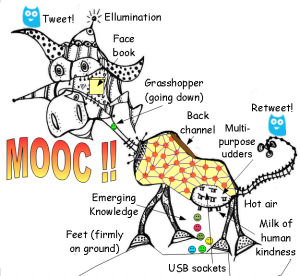One of the interesting changes that has been happening in recent years in the world of information is the rise of the MOOC (Massive Online Open Course). Heralded by many as a revolutionary and disruptive, they are like a lot of things on the internet, actually not that new. Online learning has been one of the drivers of the web since Tim Berners Lee first started creating networked webpages to share information. One of the great promises of the internet is education and increasing access to it and the MOOC seems to meet this demand.
A MOOC is essentially an online learning course created by teachers and amplified by social networks. Always fancied going to Harvard, but couldn’t afford the bus-fare from rural Ireland? Sign up to their MOOC, watch their top lecturers on video and discuss what they are talking about with your new classmate from down the road in India on a a forum or through twitter hashtags. Or don’t.

Based on ‘la vaca de los sinvaca’ by José Bogado Creative Commons Licence.
http://gbl55.wordpress.com/2011/03/08/cck11-man-this-mooc-is-something-else/
Online Education has traditionally been managed by Learning Management Systems such as Moodle or Blackboard. These are usually closed systems and they give the educator more control over the learning experience.
However, the rise of smart phones, video and web 2.0 tools has let the cat out of the bag. Education academics are arguing over the pedagogy involved and its impact on the future of universities. The high drop-out rate is a feature of MOOCs and so is the fact that those who do well are those who do well with self directed learning anyway. Are video lectures not just a high tech version of the teacher in Ferris Bueller droning on and on? There is also a concern that some courses are just dumbed down general introductory modules for those who cannot afford university and that the end result will be a two tier education system. That has not been my experience so far, but it is a concern.
Business people are wondering who is going to pay for all this content. I am sure that it will not take them long to figure that out. Yes, MOOCs do increase access to education as long as you have access to technology so there is that ongoing struggle, but that is not new. Librarians are worried about copyright issues and how to manage the distribution of the content. Students are worrying about credits for their courses, but on the other hand that new module on Big Data in Archaeology looks like it could really add to my own specific learning needs and let us not forget the network that we are being introduced to (Big wave to all my virtual classmates) and how MOOCs contribute to lifelong learning.
Examples
Coursera is the leader in this field. It was set up by Stanford after they saw the success of their online lectures. They chop up their lectures and offer online quizzes for students to complete. Some of their courses have gained accreditation this year. However, they got a lot of negative publicity after one of their courses crashed due to technical problems, leaving 40,000 students without any course. Ironically the course was in Fundamentals of Online Course Design. A good learning experience for everyone.
Udacity was set up by another Stanford professor who could not go back to face to face teaching after his online lectures were so successful. It currently operates as a commercial enterprise.
EdX is a MOOC that was set up by Harvard and MIT at a cost of 60 million dollars. Along with video lectures, it has interactive virtual labs, etextbooks, and online discussions. It currently operates as a free service.
Alison.com offers hundreds of free courses, mostly in basic multimedia, office skills etc and it is used by a lot of US employers to upskill their employees. This is actually a growth area for online learning.
FutureLearn is a new initiative which has been set up between Open University and 23 universities in the UK, including Trinity College.
Google have already released a free open source course builder as an experiment. It allows courses to be created by webmasters using Python and Javascript code. They have partnered with Edx to create mooc.org
WordPress have developed a plugin (Sensei) which creates courses with built-in lessons. You can put videos or pdfs in them and then run a quiz that people have to pass in order to advance to the next lesson. There is the option to tie this in with e-commerce plugins to facilitate paid courses.
Personally, I think MOOCs are great. I am a big fan of DS106 although they will probably argue that they are not a MOOC. I like that I can pop in and out of there at my own pace. I can see a lot of what other participants are doing and I never fail to get inspired to try out new things. For this sort of content (digital media), I like to take my time. I am also participating in a more traditional MOOC with weekly lectures and academic readings about storytelling. Both these two and the one that I dropped out of (metadata – sorry Coursera, it wasn’t you, it was me) were three areas that I wanted to learn more about.
What has been your experience of MOOCs?
http://www.nytimes.com/aponline/2013/02/07/us/ap-us-massive-online-courses.html?hp&_r=1&
http://www.insidehighered.com/news/2013/02/04/coursera-forced-call-mooc-amid-complaints-about-course
http://code.google.com/p/course-builder/
http://hackeducation.com/2012/12/03/top-ed-tech-trends-of-2012-moocs/